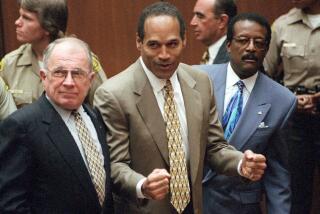J. David Investors Still in Dark on Repayment
SAN DIEGO — Nearly two years after disgruntled investors forced fraud-ridden J. David & Co. into bankruptcy, the trustee in charge of liquidating the company still does not know how much money will ultimately be returned to those who invested.
In a letter mailed Wednesday to 3,900 investors and creditors of the failed La Jolla firm, bankruptcy trustee Louis Metzger said that the estate has recovered nearly $22.5 million in funds. After expenses and challenges, however, the estate has undisputed claim over only $9.3 million of those funds, Metzger said in his letter.
Metzger is suing to recover another $27 million to $29 million from so-called preference payments--funds paid to investors in the 90 days before the J. David bankruptcy. The two-year statute of limitations on filing lawsuits will expire Feb. 13.
‘Not Now Possible to Tell’
Because the outcome of those lawsuits remains uncertain, “it is not now possible to tell you when money will be distributed or how much,” Metzger wrote to the investors.
In a federal court filing, also mailed to investors and creditors, Metzger’s attorneys have asked permission to mail future bankruptcy updates only to those people who have filed claims against the estate. That probably would cut in half the list of 3,900 interested parties who now received the bulky but irregularly published updates.
In addition, Metzger has submitted a list of 329 individuals and businesses that withdrew more funds from J. David than they invested. Most of them have already been sued by Metzger, and the trustee is asking court approval to limit future litigation to only the names submitted.
“The purpose of the order is to ask if anyone objects to it,” Metzger said in an interview Wednesday.
$1.8 Billion in Claims Filed
Metzger will formally present his request at a Feb. 14 hearing before U.S. District Judge J. Lawrence Irving, who is overseeing the complicated bankruptcy case.
So far, nearly 5,300 investors and creditors have filed claims for an astonishing $1.8 billion, or about nine times more money than federal prosecutors maintain that J. David took in between 1981 and 1984.
J. David & Co. attracted nearly $200 million from about 1,500 investors with claims of annual returns of up to 40%. In reality, however, J. David (Jerry) Dominelli operated a typical “Ponzi” scheme, whereby new infusions of cash were used to pay off existing investors. About $82 million in investor funds was actually lost.
Dominelli pleaded guilty to four counts of fraud and income tax evasion last March and was sentenced to 20 years in federal prison. A federal grand jury investigation into other key J. David figures--including Nancy Hoover, Mark Yarry and attorney Norman Nouskajian--is continuing.
Many of Dominelli’s and Hoover’s far-flung assets have been sold off or repossessed. Their sprawling Rancho Santa Fe home, for example, has been offered for sale since 1984 for $2.3 million, but the best offer so far has been for only $1.7 million, according to Metzger.
The lender took possession of the house on Jan. 17.
Legal and accounting fees have totaled $2.5 million but have been on a downward trend since April, 1984, Metzger wrote. About half of all administrative expenses are now being paid from interest earned on liquidated assets.
In his court filing, Metzger explained that it would be prohibitively expensive to reconstruct all of Dominelli’s financial dealings.
Among the reasons for this, according to the filing, were the “unavailability of witnesses” who have left the United States; the refusal of some witnesses to waive their Fifth-Amendment rights against self-incrimination; the destruction of various J. David records in the waning days of the company; Dominelli’s physical condition, as he continues his recovery from a stroke suffered in October, 1984; the lack of documentation for the “unmethodical” way in which Dominelli loaned money to friends and associates, and the absence of any audited financial statements.
More to Read
Inside the business of entertainment
The Wide Shot brings you news, analysis and insights on everything from streaming wars to production — and what it all means for the future.
You may occasionally receive promotional content from the Los Angeles Times.










